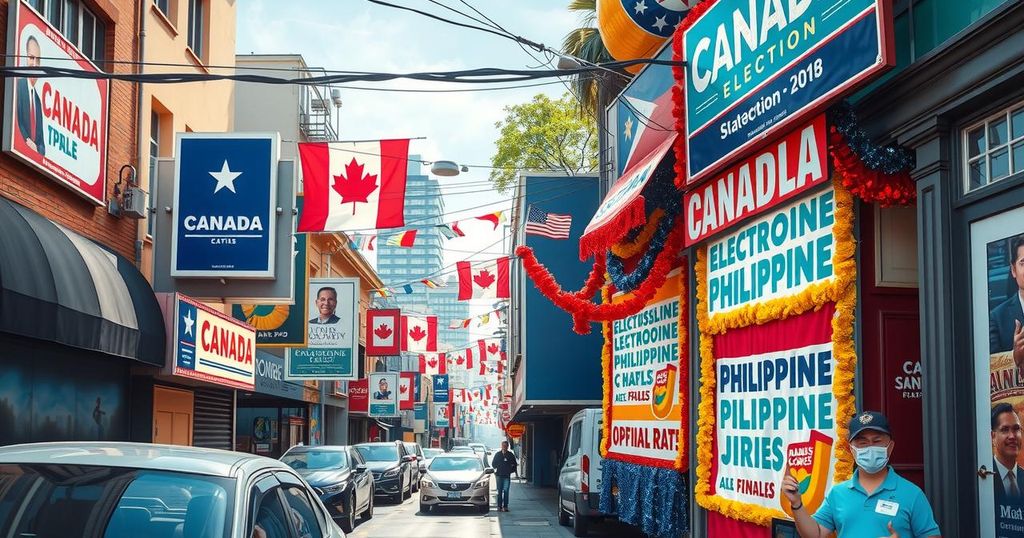Contrasting Political Landscapes: Elections in Canada and the Philippines

This article contrasts the political climates of Canada and the Philippines, reflecting on recent elections in both regions. It highlights Canada’s structured, low-key campaign environment against the backdrop of the Philippines’ chaotic, high-energy electoral atmosphere. The piece calls for necessary reforms in the Philippines, emphasizing the need for effective governance and representation of marginalized communities.
SASKATOON — The outcome of Canada’s recent election may already be in by the time this is read. I have had the opportunity to cover federal elections multiple times, including my first assignment in 2021 for Maxime Bernier’s People’s Party of Canada at the Saskatoon Inn & Conference Centre. Then there was last year’s provincial election where the Saskatchewan Party secured a fifth consecutive majority, although not without struggle in Regina and some ridings in Saskatoon. Meanwhile, the Saskatchewan NDP saw their representation double in the Legislature.
Following that, city elections unfolded in November, marking major milestones. Cynthia Block was elected as the first female mayor of the city, and Senos Timon made history as the first city councillor of African descent after fleeing the civil war in Sudan with his family back in 2000.
In our six years of residing in Saskatoon, I have observed provincial and city campaigns marked by simplicity. I noticed lawn signs, billboards, and the odd candidate flyer left in mailboxes; campaigns felt subdued, lacking the grand spectacle often seen elsewhere. This is especially notable when compared to the vibrant electoral scenes in the Philippines and from my time in Saipan, a U.S. territory in the Pacific.
I was raised in Manila, the Philippines’ capital, which is heading towards elections with over 18,000 local positions, including 12 Senate seats, on the ballot. During a recent visit, the heat reached sweltering highs of 41 C, and amid my personal trip, I encountered the vibrant and loud electioneering back home. Campaign jingles blare as early as 7 a.m., and candidates plaster their images everywhere—streets, houses, and poles.
Interestingly, the jingles remix popular tunes for political messaging. Yet, the situation extends grimly in rural municipalities where violence erupts, with political rivals employing hired guns against candidates. The persistence of vote-buying adds a troubling layer to an already complex political landscape.
This chaotic picture has persisted since I turned 18 and could vote. Campaign rhetoric often promises support for the poor and marginalized. Some officials make good on this, while others prioritize personal gain at the expense of the public welfare.
A significant issue arises from political dynasties in the Philippines, where many candidates hail from families entrenched in the power structure for decades. The case of Las Piñas illustrates this, where a prolonged political family rivalry will shape the next mayoral race. As for the Senate candidates, the field appears crowded with familiar names, including entertainers and questionable characters, overshadowing the few credible individuals.
One major hurdle for the electorate is a lack of informed decision-making, particularly among the poorest. Campaign entertainment often takes precedence over substantive evaluation of candidates. Outrageously, individuals with criminal charges, such as Pastor Apollo Quiboloy, still find themselves eligible for Senate candidacy despite severe allegations.
Senators ought to be diligent legislators—crafting laws and representing everyone. Yet, what is disheartening is seeing the same faces during my recent visit, reminiscent of a cycle whereby politicians utilize patronage politics. The cultural expectation of “utang na loob,” a debt of gratitude, keeps voters loyal to these dynasties, further entrenching the same regime.
Having moved to Canada, I continue to hope for change in the Philippines. I envision a future where marginalized voices resonate in the Legislature, where the rights of ordinary people are prioritized. I long for an improved quality of life, just wages for laborers, accessible education, and transparency within governance. I wish to see taxes spent effectively on programs that genuinely uplift the populace, rather than filling the pockets of a ruling elite.
In summation, the contrasting electoral environments of Canada and the Philippines reveal fundamental differences in political campaigning and engagement. While Canada exhibits a more restrained, solemn approach to elections, the Philippines exemplifies a vibrant but often chaotic system governed by entrenched familial political structures and issues like violence and vote-buying. There remains hope for change in the Philippines, advocating for a stronger representation of marginalized voices and a commitment to accountable governance, something the author longs to witness in their lifetime.
Original Source: www.sasktoday.ca








